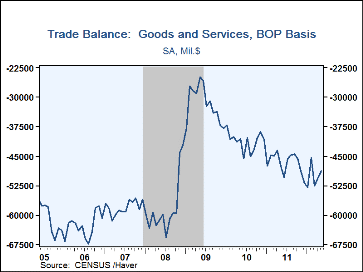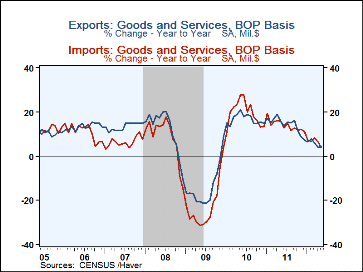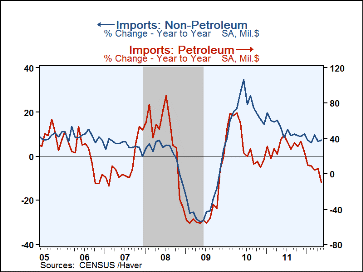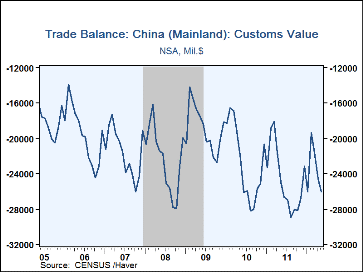 Global| Jul 11 2012
Global| Jul 11 2012U.S. Trade Deficit Narrows As Oil Imports Drop
by:Tom Moeller
|in:Economy in Brief
Summary
The U.S. foreign trade deficit during May narrowed sharply to $48.7B from a little-revised $50.6B in April. Expectations were for a deficit of $49.0B. Exports ticked up 0.2% (4.2% y/y) while imports fell 0.7% (-9.8% y/y) with lower [...]
The U.S. foreign trade deficit during May narrowed sharply to $48.7B from a little-revised $50.6B in April. Expectations were for a deficit of $49.0B. Exports ticked up 0.2% (4.2% y/y) while imports fell 0.7% (-9.8% y/y) with lower oil imports. In chained 2005 dollars, the deficit in goods deepened slightly to $48.0B in May from $49.7B. Real exports rose 1.0% (4.9% y/y) and real imports increased 0.3% (3.6% y/y).
Total imports fell 0.7% (+3.8% y/y) in May as goods imports fell 0.8% (+3.7% y/y). However, the decline was not broad-based amongst categories.The decline in oil prices to an average $107.91 helped lower the value of petroleum imports in May by 8.4% (-9.8% y/y). When adjusted for prices, petroleum imports fell 3.9% (-9.7% y/y).Nonauto consumer goods imports fell 0.9% (+0.9% y/y) while imports of foods, feeds & beverages dropped 0.5% (+1.6% y/y).
Elsewhere, imports of nonpetroleum goods in real terms increased 1.3% (7.2% y/y).Imports of autos & products rose 3.1% (29.1% y/y) while capital goods imports also increased 3.1% (10.6% y/y). Imports of other goods gained 5.2% (13.4% y/y). Finally, imports of services rose 0.2% (6.0% y/y) as travel imports rose 0.2% (9.1% y/y).
Overall U.S. exports inched up 0.2% (4.2% y/y) as nonpetroleum goods exports increased 0.4% (4.2% y/y). Exports of foods, feeds & beverages rose 8.3% (8.7% y/y) and capital goods exports gained 1.6% (6.4% y/y). "Other" goods exports jumped 5.2% (13.4% y/y). To the downside were nonauto consumer goods exports by 1.2% (+3.8% y/y), auto exports by 0.9% (+12.3% y/y) while lower oil prices led industrial supplies exports down 2.0% (+1.4% y/y). Exports of services rose 0.7% (3.2% y/y).
By country, the May goods trade deficit with mainland China deteriorated sharply to $26.0B, its deepest since January. Exports to China jumped 13.5% y/y while U.S. imports gained 6.6% y/y. With Japan, the deficit doubled y/y to $6.4B as U.S. exports rose 1.2% y/y but U.S. imports also nearly doubled. The deficit with the European Union deepened y/y to $10.5B with a slim 0.8% y/y gain in exports to Europe and a 5.5% y/y rise in imports.
The international trade data can be found in Haver's USECON database. Detailed figures are available in the USINT database. The expectations figures are from the Action Economics consensus survey, which is carried in the AS1REPNA.
The Global Economy and the European Sovereign Debt Crisis from the Federal Reserve Bank of St. Louis can be found here.
| Foreign Trade | May | April | Mar | Y/Y | 2011 | 2010 | 2009 |
|---|---|---|---|---|---|---|---|
| U.S. Trade Deficit | $48.7B | $50.6B | $52.6B | $47.7B (5/11) |
$559.9B | $494.7B | $381.3B |
| Exports (%) | 0.2 | -0.9 | 2.5 | 4.2 | 14.2 | 16.7 | -14.5 |
| Imports | -0.7 | -1.6 | 5.2 | 3.8 | 13.9 | 19.5 | -23.0 |
| Petroleum | -8.4 | -1.0 | 8.8 | -9.8 | 30.8 | 32.5 | -44.0 |
| Nonpetroleum goods | 1.1 | -2.0 | 5.3 | 7.2 | 12.1 | 20.8 | -20.9 |
Tom Moeller
AuthorMore in Author Profile »Prior to joining Haver Analytics in 2000, Mr. Moeller worked as the Economist at Chancellor Capital Management from 1985 to 1999. There, he developed comprehensive economic forecasts and interpreted economic data for equity and fixed income portfolio managers. Also at Chancellor, Mr. Moeller worked as an equity analyst and was responsible for researching and rating companies in the economically sensitive automobile and housing industries for investment in Chancellor’s equity portfolio. Prior to joining Chancellor, Mr. Moeller was an Economist at Citibank from 1979 to 1984. He also analyzed pricing behavior in the metals industry for the Council on Wage and Price Stability in Washington, D.C. In 1999, Mr. Moeller received the award for most accurate forecast from the Forecasters' Club of New York. From 1990 to 1992 he was President of the New York Association for Business Economists. Mr. Moeller earned an M.B.A. in Finance from Fordham University, where he graduated in 1987. He holds a Bachelor of Arts in Economics from George Washington University.










